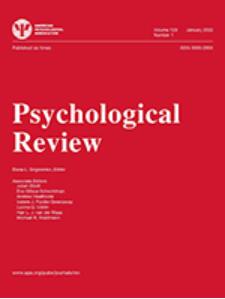认知网络的丰富而非退化解释了心理词汇的老化,并将流体智能和结晶智能联系起来。
IF 5.8
1区 心理学
Q1 PSYCHOLOGY
引用次数: 0
摘要
认知是一个由相互作用的成分组成的复杂系统。老年认知能力下降通常被解释为这些组成部分之间相互联系的退化。来自老化的心理词汇的证据证实了这一解释,因为老年人在自由联想任务中产生更高的熵反应,似乎有更稀疏的自由联想网络,并且判断对象之间的相似性不如年轻人。在这里,我证明了所有这些影响都是由认知网络丰富模型产生的,该模型将衰老视为终身学习的延伸。通过增加互联性,学习增加了潜在目标之间的激活竞争,增加了熵并减少了目标激活。网络丰富的影响是用一个通用的预测误差模型(Rescorla-Wagner)来证明的,该模型通过对环境中关联网络的终身体验来学习和丰富认知网络表征。从学习到的表示中抽样产生的行为再现了上述效果。定性模型比较表明,各种退化模型在熵和相似度上都不能捕捉到上述结果。根据数据收集的具体方法细节,丰富和退化的表示都可以产生无稀疏的关联网络。这强调了从行为推断表示而不考虑过程的一般问题。此外,更广泛地扩展认知网络丰富为过度关注无关刺激和认知减缓提供了终身发展途径——干扰增加,资源限制增加,目标激活减少——为结晶智力上升和流体智力下降提供了共同原因。(PsycInfo Database Record (c) 2025 APA,版权所有)。本文章由计算机程序翻译,如有差异,请以英文原文为准。
Cognitive network enrichment, not degradation, explains the aging mental lexicon and links fluid and crystallized intelligence.
Cognition is a complex system of interacting components. Late-life cognitive decline is often explained as a degradation of the interconnectivity among these components. Evidence from the aging mental lexicon corroborates this interpretation, as older adults produce higher entropy responses in free association tasks, appear to have sparser free association networks, and judge objects to be less similar to one another than younger adults. Here, I demonstrate that all of these effects are produced by a model of cognitive network enrichment, which treats aging as an extension of lifelong learning. By increasing interconnectivity, learning increases competition for activation among potential targets, increasing entropy and reducing targeted activation. The impact of network enrichment is demonstrated using a general prediction error model (Rescorla-Wagner), which learns and enriches a cognitive network representation following lifelong experience with a network of associations in the environment. Sampling from the learned representation to produce behavior reproduces the above effects. A qualitative model comparison shows that various models of degradation fail to capture the above results for entropy and similarity. Both enriched and degraded representations can produce sparsening-free association networks, depending on the specific methodological details of data collection. This underscores the general problem of inferring representation from behavior without considering process. Further, extending cognitive network enrichment more broadly provides a lifelong developmental pathway for overattention to irrelevant stimuli and cognitive slowing-increasing interference, taxing resource limitations, and reducing targeted activation-offering a common cause for rising crystallized intelligence and declining fluid intelligence. (PsycInfo Database Record (c) 2025 APA, all rights reserved).
求助全文
通过发布文献求助,成功后即可免费获取论文全文。
去求助
来源期刊

Psychological review
医学-心理学
CiteScore
9.70
自引率
5.60%
发文量
97
期刊介绍:
Psychological Review publishes articles that make important theoretical contributions to any area of scientific psychology, including systematic evaluation of alternative theories.
 求助内容:
求助内容: 应助结果提醒方式:
应助结果提醒方式:


